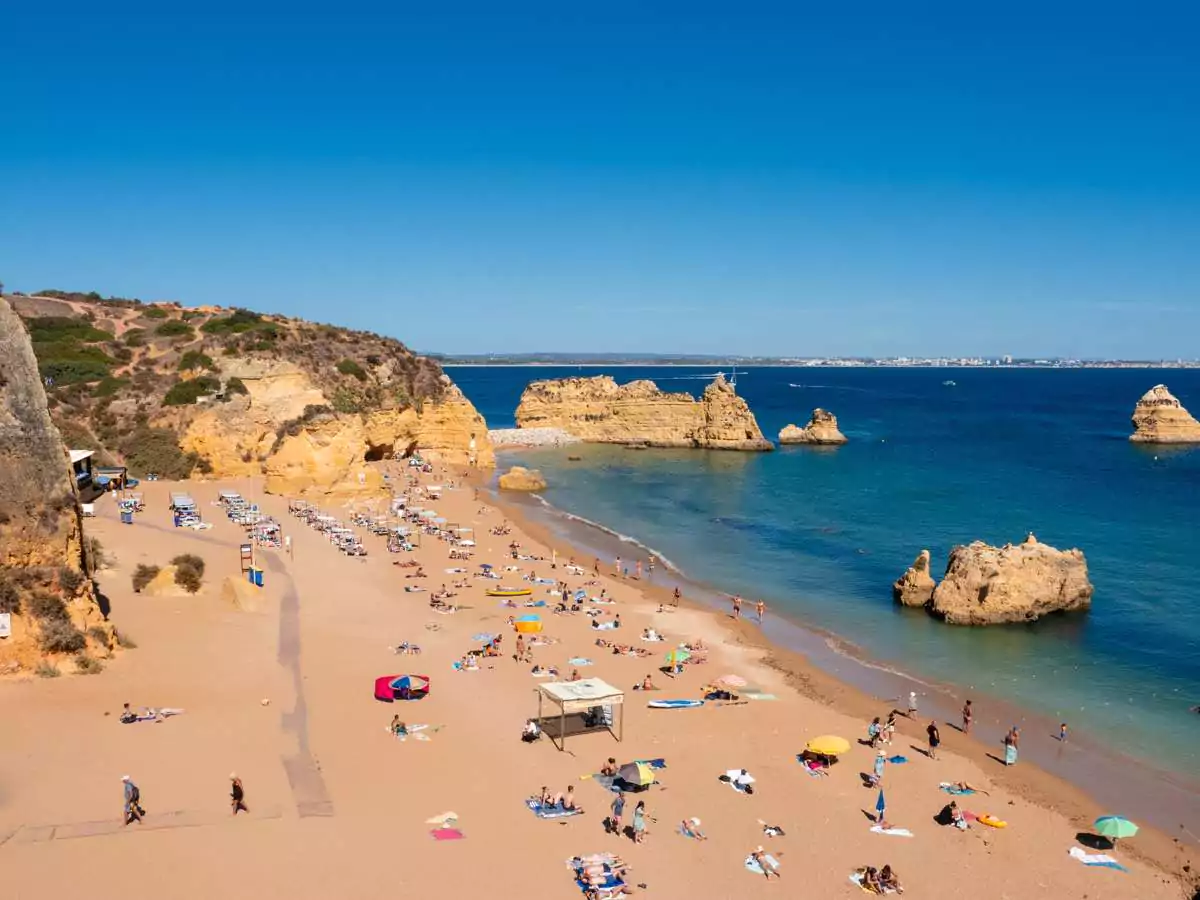The Algarve, Portugal’s southernmost region, is world famous for its stunning coastline, warm climate, traditional towns, and popular beach resorts. The region is a paradise for beach lovers offering everything from deserted beaches, to bustling beach clubs, and surfing hotspots. It’s not just about the beaches though, towns like Faro, the regional capital, Tavira, and Silves are steeped in history, offering a glimpse into the region’s past with their well-preserved castles, historic centers, and ancient ruins. The inland Algarve, while much quieter and more traditional, has ample opportunities for you to discover villages, go hiking, bird watching, and uncover local cuisine and craft production.
Basics of the Algarve
- Location: Stretching along Portugal’s southern coast, the Algarve borders Spain in the east, and the Alentejo region to the north.
- Accessibility: The Algarve is easily accessible by air, with Faro Airport serving as the main gateway. The region is also well-connected by road and rail.
- Climate: The Algarve is features a Mediterranean climate, featuring hot, dry summers and mild, wet winters. It’s renowned for its sunny weather (averaging 300 sunny days a year), making it a year-round destination.
- Cuisine: The Algarve’s cuisine is rich in seafood dishes like “Cataplana de Marisco” and “Sardinha Assada.” The region is also known for its almond and fig sweets, and even liquor production, Medronho being its most famous.
Top Things to See and Do in the Algarve
- Faro: The capital of the Algarve, Faro, offers a charming old town, the Sé Cathedral, and the Ria Formosa Natural Park, known for its unique lagoon system and birdlife.
- Lagos: Known for its historic center, stunning cliffs, and beautiful beaches like Praia Dona Ana and Ponta da Piedade.
- Albufeira: A popular resort town with lively nightlife, gorgeous beaches, and the nearby Zoomarine theme park.
- Portimão and Praia da Rocha: Portimão offers a mix of culture and beach life, with Praia da Rocha being one of the Algarve’s most famous beaches.
- Tavira: A picturesque town known for its traditional architecture, Roman bridge, and the nearby Ilha de Tavira beach.
- Silves: A historic town with a well-preserved castle, offering insights into the region’s Moorish past.
- Sagres and Cape St. Vincent: The southwestern most point of Portugal, known for its dramatic cliffs and the historical Sagres Fortress.
- Ria Formosa: A stunning natural park with unique landscapes, perfect for bird watching and boat tours.
- Monchique Mountains: Offering a contrast to the coastal scenery, these mountains are great for hiking and enjoying panoramic views.
- Vilamoura: Famous for its glamorous marina, world renowned golf courses, luxury hotels and a casino.
Cultural Experiences in the Algarve
- Seafood: Enjoy fresh seafood and local wines at coastal restaurants.
- Wine Tasting: The Algarve has a long history of wine production, and there’s several vineyards available for you to explore.
- Cultural Festivals: The Algarve features a lively events calandar, from one of the biggest Portuguese Carnival’s in Loulé, to a sardine festival in Portimao. It’s a great place to experience traditional Portuguese festas and feiras!
- Golfing: The Algarve is renowned for its world-class golf courses.
Tips for Travelers
- Accommodation: Options range from luxury resorts to boutique guesthouses, surfer hostels, and city apartments.
- Local Transportation: A regional trainline crosses the Algarve from east to west, and links it to Lisbon. Public transport and buses are available between many of the smaller towns and villages but can be sporadic. Renting a car offers more flexibility to explore remote beaches and towns.
- Safety: The Algarve is generally safe, but basic travel precautions are recommended. Staying aware of your belongings, and surroundings.
The Algarve region blends a stunning coastline, historic towns, and lively cultural and arts scene. It’s a location that offers every type of traveler something, from offgrid experiences in pristine nature, to beach front luxury resorts.
